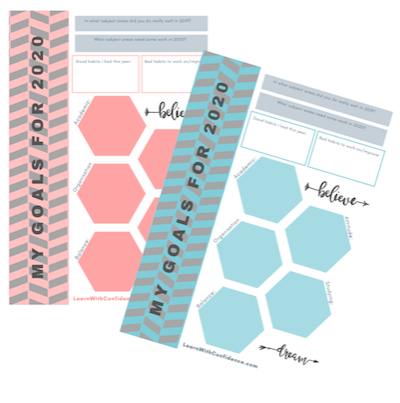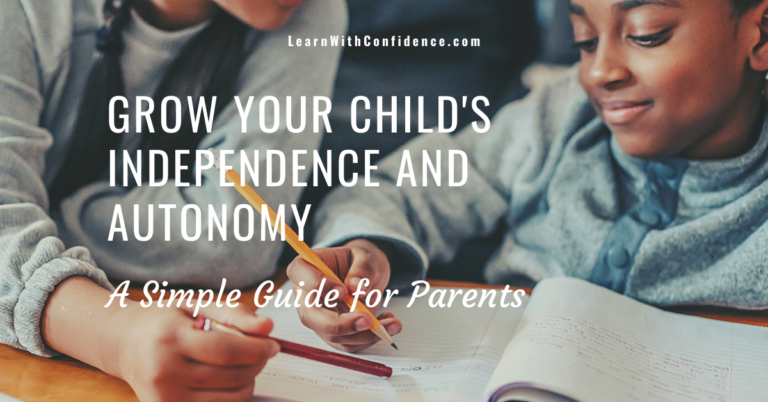How to set goals with your child.
So you’re probably about to receive your child’s school report; a summary of their academic progress through the year. Are you excited? Anxious? How does your child feel? It may seem like now is a great time to close the book at the end of this year’s chapter, but instead, why not use this time, while everything is fresh in everyone’s mind, to set some goals for 2020.

This post is designed to help you practically as you sit with your child to discuss the goals he or she would like to achieve in 2020.
Use this FREE printable template to set some goals with your child for 2020.

Assess this years progress
What subject areas did you do really well in?
Ask your child what their favourite subjects was this year – what did they really enjoy learning? Why did they enjoy the subject so much? Did they like the teacher, the activities, did they find the work easy to understand?
This question is really important because when children enjoy what they’re doing and they can see their potential to succeed in that subject, they can achieve much more. We often focus on the next question, but let’s start by first celebrating the great things that have happened this year!
What subjects areas need some work?
Which subjects did not yield the greatest results? Why does your child think they didn’t achieve what they could have achieved? Is it because they don’t believe they can do it, or because they didn’t like the teacher, or because they didn’t understand the concepts? Or maybe its because they’ve had a poor work ethic this year and haven’t put the effort into their work this year?
Instead of using this question as an opportunity to tell your child what you think, let them respond and really listen to what they say. You may need to lead them with questions, but taking ownership of their successes and failures starts by acknowledging them, themselves!
What good habits did you have this year that helped at school?
Identify what are some good things or attitudes your child has done or displayed this year on a regular basis that have helped them achieve the results they have achieved.
Some good habits might include the following:
- Getting to bed at a good time every night
- Drinking 1-2l of water every day
- Doing some exercise / sport regularly
- Doing your homework every day
- Studying for tests in advance
- Having a good attitude toward your work
- Being prepared with everything you need for school every day
If something becomes a habit it’s easy to maintain, you don’t even have to think about it, it’s automatic. And these habits will help them manage their time and responsibilities more effectively.
What are some bad habits that need some work?
From the above list, you and you child can probably identify some of the bad habits they need to work on in the future.
Bad habits are hard to break sometimes! The first step though, is in acknowledging that they need changing. Then you need to replace that bad habit with something better.
- If studying last minute is a problem, work 30 min of studying time into your child’s homework time, every day.
- If having too many extra murals that homework isn’t getting completed, some changes need to be made to your child’s schedule or they need to see how they can use ‘idle time’ (while waiting for their karate lessons or traveling in the car) to complete homework tasks.
- If getting to bed late is a problem, find out what’s keeping your child from an early bedtime and take steps to eliminate the problem.
Set some goals
Now that you have a better idea of where your child’s strengths and weaknesses lie, it’s time to sit together and set some goals.

Academic goals
Whenever I ask my school kids what their goals are for the year, they often give me a mark or grade they want to receive for a particular subject or their overall aggregate. I don’t particularly like that children only set goals for themselves that involve achieving a certain mark – I believe there are more important goals to achieve that involve their attitude or work ethic or other skills they will use for the rest of their lives.
That being said, sometimes, it is helpful to have a number to work towards. Kind of like your financial budget.
So set a number for every subject. For those subjects your child is talented in, finds the easiest, set a nice high goal. For those subjects they find most challenging, or are struggling in, set a lower goal.
This is important: Your child does not have to be gifted in every subject area. Every child is unique and has different strengths and weaknesses. Every child has a different potential to achieve. Please set realistic goals with your child to help them achieve the best results they can in all of their different subjects!
Attitude goals
What is your child’s attitude toward school, their teachers, their work, studying? What’s your child’s attitude about success and failure? How do they cope with achieving great marks? How do they cope when they achieve less than stellar results? How do they deal with difficult and challenging work?
Set some goals with them about their attitude in these areas. Be specific though. It doesn’t help to say ‘My goal is to be more positive.’ Rather think of a specific situation or area in which you can be more positive. For example: ‘When I can’t solve a Math sum, I won’t give up, I will keep trying.’ ‘When I achieve a really good mark I will be happy, humble and thankful, and celebrate other people’s success too.’ ‘When I go to class with a teacher I don’t like, I will be patient and polite and keep giving my best.’
Developing the right attitude is so important for handling every challenge that will come across your child’s path as they grow up.
Organisational goals
When your child is organised and prepared they feel more confident and in control of the situation. For some children, staying organised is a huge challenge but with the right support and structures in place and some consistency in developing routines and habits, they can really succeed in this area!
Here are some ideas for how you can develop those routines and habits to set your child up for success every day. Set some specific goals around these things.
- Having a routine when they get home – unpacking lunch bags, setting out the things they need for homework etc.
- Homework routine – getting work done in order of priority, slotting in some time every day for studying
- Post-homework routine / evening routine – packing books etc that are needed for the next day, setting out their school clothes, packing their sport clothes, etc.
School work / Studying goals
When it comes to achieving great results, consistency is key. Set goals with your child around working diligently through the year: completing their school work and homework, doing their best on projects and assignments, studying consistently for tests.
Maybe they need to work on their study skills and develop some good techniques that will suit their learning style. Maybe they need to get their work and deadlines organised so they don’t miss out on a task or leave it to the last minute. Maybe they need to plan out their studying section by section so they can create study notes or mind maps on a weekly basis.
Here’s a great resource to help your child get organised with a FREEBIE to plan out your child’s studying section by section.
Balance goals
Finally, and probably the most important but most overlooked, I would like to suggest that you set some goals with your child that helps them live a balanced life.
Do they play sport or exercise regularly? Do they have a hobby that they really love to do? Do they spend enough time visiting with their friends and family? Do they help out with chores around the house? How much time do they spend reading every day or week? How much sleep are they getting every night? Are they eating healthily?
Often parents feel that, especially if their child hasn’t done as well as they expected, that they should take away all the other things the child involved in, so they can spend more time doing school work or studying. Sometimes there is room for this if a child is just way too over-committed and they literally do not have enough hours in the day to do their school work. But there has to be a balance.
As a mom you know all about having a bunch of different responsibilities and how important it is to balance it all out. This is how it will also be for our kids when they grow up. We have to teach them how to balance all of the demands on them as well as factoring in time to relax and look after themselves.
Here are 7 practical tips for how to help your child maintain a healthy, balanced life.
Write it down.
If you want to achieve a goal you have to write it down and post up somewhere you can see it regularly. There is something about the act of writing down your goals that inspires you to achieve them.
I’ve created this FREE template so you can do just that! Print it out, spend some quality time with your child, over a pizza or milkshake, chatting through the points from this post and together, jot down some goals in each of the areas mentioned above. Limit it to a maximum of three goals per section so it doesn’t seem like an impossible task. You can always add to them later.
And when they are written down, you can enjoy the satisfaction of crossing them off as you achieve them! Good luck!

